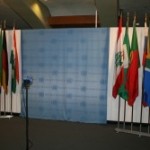 The United Nations Security Council finally united behind a plan for a political transition and a ceasefire in Syria this week, and US top diplomat Hillary Clinton was correct in saying the Council spoke “with one voice.” Unfortunately, that’s about all they did. Time—and remaining options to resolve the conflict with political freedom for Syria—is running out.
The United Nations Security Council finally united behind a plan for a political transition and a ceasefire in Syria this week, and US top diplomat Hillary Clinton was correct in saying the Council spoke “with one voice.” Unfortunately, that’s about all they did. Time—and remaining options to resolve the conflict with political freedom for Syria—is running out.
The Council’s statement—and that’s all that it was—did threaten to “consider further steps as appropriate.” But with Russia and China wielding veto power, there’s little hope the Council will do anything that will actually change President Bashar al-Assad’s heart from slaughtering his own people.
The UN has said over 8,000 people have died in the violence so far, thousands of them innocent civilians. Assad has literally shelled neighborhoods and there are reports he put landmines down to prevent people from fleeing the country.
And while the West and Arab nations have sanctioned Syria on multiple levels, the measures either don’t bite enough—or can’t.
The latest step by the European Union on Friday highlights the helplessness of sanctions. With all the horrors happening in Syria, including the EU saying they are “greatly concerned” regarding the landmines reports, they sanctioned another dozen people associated with the Assad regime. The individuals are now banned from entering the EU and have had their assets frozen.
Doubtless this will increase some personal pressure on Assad as friends and family complain about canceling their European vacation or losing their Swiss bank accounts, but Assad is murdering thousands of his own people. Little will phase him now, especially since the life of his regime—if not his person—demands he outlast the rebels.
Tragically, it appears more and more likely he will do so unless the West begins actively supporting the rebels or finds some other dramatic way to change Assad’s calculus.
The Washington Post reported that rebels are entering neighboring Turkey and complaining of being out of ammo—and in some cases even food. Post reporter Liz Sly wrote in the article that the rebels “are acknowledging for the first time that the rebellion, at least the armed portion of it, might be faltering in the face of a concerted government offensive aimed at definitively crushing the year-old revolt.”
The Syrian people have valiantly opposed the regime for over a year despite a brutal crackdown. Mass marches, armed rebellion and appealing for international support have fused into a surprisingly long-lived opposition.
But heart can only go so far—enough bullet wounds and it eventually stops beating.
If the Post’s report is accurately portraying the situation for the rebels, that flatline time is on the horizon even if things aren’t hopeless yet.
Now is therefore the time for the West to act. The Mideast Update has recommended a dramatic airlift of humanitarian aid into the besieged towns as a way to send food and medical supplies while also forcing an Assad ceasefire so as not to hit Western planes. That’s one option and the least intense.
Other choices are arming the rebels, and thereby encouraging a civil war, or the West getting militarily involved themselves—which while successful in Libya is not a recipe for success everywhere. This website certainly isn’t clamoring for another Iraq.
Still, something has to be done. Maybe it’s finally threatening military action and hoping that’s not necessary. Maybe it’s openly funding and arming the rebels. Maybe it’s an airlift. Maybe it’s some serious sanction not tried yet—something that will change the circumstances so clearly that Assad will know he is the one running out of time and now is the time to compromise and bargain.
If the West does nothing, Assad will do as his father did—murder thousands and escape redhanded. To this point the world has been unwilling to get its hands dirty in Syria. But they’re increasingly becoming stained with blood.
(By Joshua Spurlock, www.themideastupdate.com, March 23, 2012)
